Understanding Japanese Business Etiquette for International Expansion
VerifiedAdded on 2020/04/13
|8
|2131
|110
Report
AI Summary
This report examines the essential aspects of Japanese business etiquette, crucial for international expansion, particularly for businesses from countries like Australia. It highlights the importance of understanding cultural nuances, including language, hierarchy, and communication styles, to build trust and successful business relationships. The report provides practical guidance on meeting etiquette, such as the significance of face-to-face meetings, business cards, punctuality, note-taking, and the use of interpreters. It also addresses gift-giving customs, seating arrangements, and appropriate behavior during meetings and dining. Furthermore, the report delves into cross-cultural communication, emphasizing the application of Hofstede's cultural dimensions theory to analyze the differences between Australian and Japanese cultures. It covers key dimensions such as power distance, individualism, masculinity, uncertainty avoidance, long-term orientation, and indulgence, offering insights into how these differences impact business practices and communication strategies. The report concludes by emphasizing the importance of politeness, sensitivity, and a thorough understanding of Japanese culture for achieving successful business outcomes in Japan.

Running head: COMMUNICATION IN BUSINESS
Communication in Business
Name of the University
Name of the Student
Author Note
Communication in Business
Name of the University
Name of the Student
Author Note
Paraphrase This Document
Need a fresh take? Get an instant paraphrase of this document with our AI Paraphraser
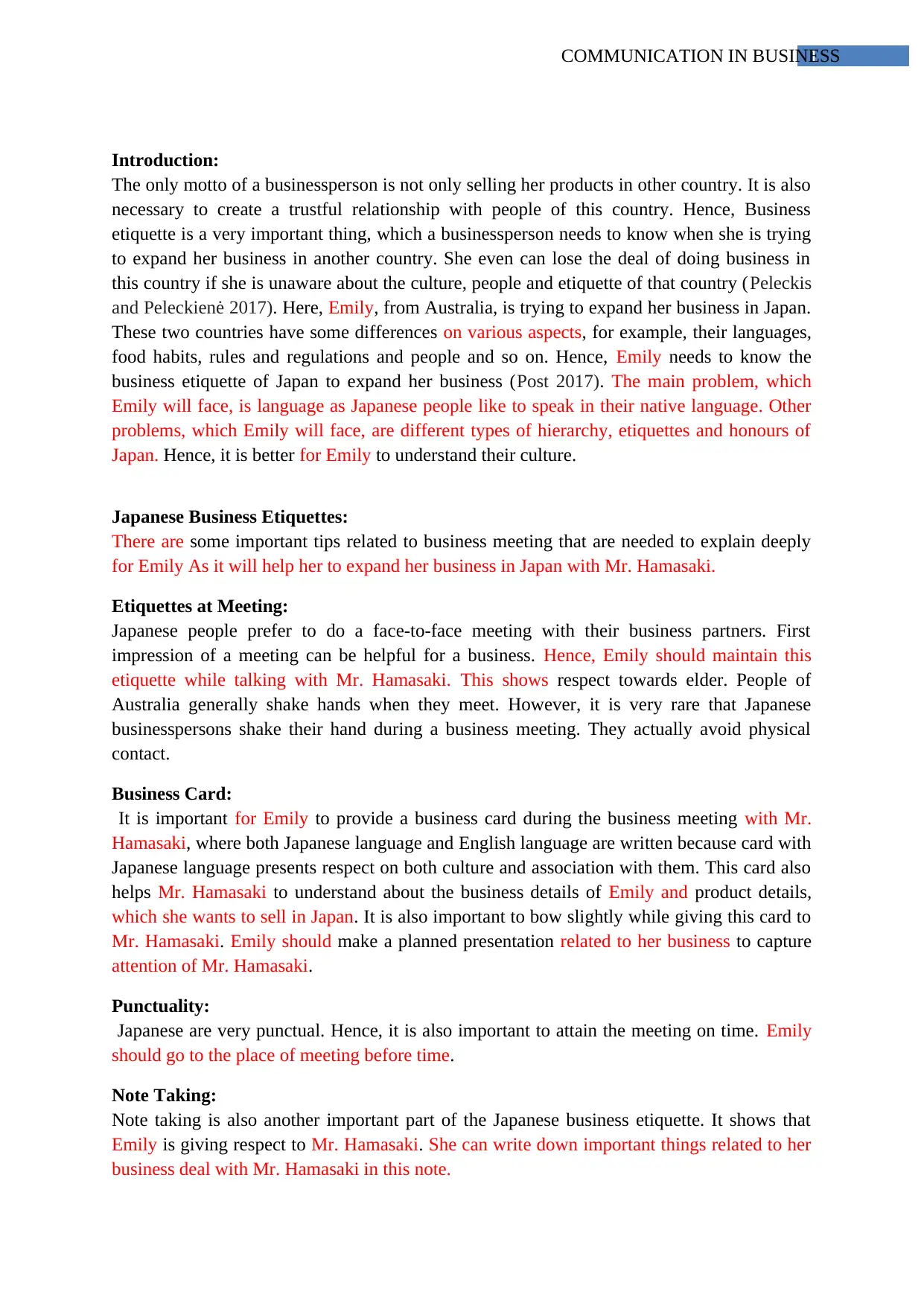
1COMMUNICATION IN BUSINESS
Introduction:
The only motto of a businessperson is not only selling her products in other country. It is also
necessary to create a trustful relationship with people of this country. Hence, Business
etiquette is a very important thing, which a businessperson needs to know when she is trying
to expand her business in another country. She even can lose the deal of doing business in
this country if she is unaware about the culture, people and etiquette of that country (Peleckis
and Peleckienė 2017). Here, Emily, from Australia, is trying to expand her business in Japan.
These two countries have some differences on various aspects, for example, their languages,
food habits, rules and regulations and people and so on. Hence, Emily needs to know the
business etiquette of Japan to expand her business (Post 2017). The main problem, which
Emily will face, is language as Japanese people like to speak in their native language. Other
problems, which Emily will face, are different types of hierarchy, etiquettes and honours of
Japan. Hence, it is better for Emily to understand their culture.
Japanese Business Etiquettes:
There are some important tips related to business meeting that are needed to explain deeply
for Emily As it will help her to expand her business in Japan with Mr. Hamasaki.
Etiquettes at Meeting:
Japanese people prefer to do a face-to-face meeting with their business partners. First
impression of a meeting can be helpful for a business. Hence, Emily should maintain this
etiquette while talking with Mr. Hamasaki. This shows respect towards elder. People of
Australia generally shake hands when they meet. However, it is very rare that Japanese
businesspersons shake their hand during a business meeting. They actually avoid physical
contact.
Business Card:
It is important for Emily to provide a business card during the business meeting with Mr.
Hamasaki, where both Japanese language and English language are written because card with
Japanese language presents respect on both culture and association with them. This card also
helps Mr. Hamasaki to understand about the business details of Emily and product details,
which she wants to sell in Japan. It is also important to bow slightly while giving this card to
Mr. Hamasaki. Emily should make a planned presentation related to her business to capture
attention of Mr. Hamasaki.
Punctuality:
Japanese are very punctual. Hence, it is also important to attain the meeting on time. Emily
should go to the place of meeting before time.
Note Taking:
Note taking is also another important part of the Japanese business etiquette. It shows that
Emily is giving respect to Mr. Hamasaki. She can write down important things related to her
business deal with Mr. Hamasaki in this note.
Introduction:
The only motto of a businessperson is not only selling her products in other country. It is also
necessary to create a trustful relationship with people of this country. Hence, Business
etiquette is a very important thing, which a businessperson needs to know when she is trying
to expand her business in another country. She even can lose the deal of doing business in
this country if she is unaware about the culture, people and etiquette of that country (Peleckis
and Peleckienė 2017). Here, Emily, from Australia, is trying to expand her business in Japan.
These two countries have some differences on various aspects, for example, their languages,
food habits, rules and regulations and people and so on. Hence, Emily needs to know the
business etiquette of Japan to expand her business (Post 2017). The main problem, which
Emily will face, is language as Japanese people like to speak in their native language. Other
problems, which Emily will face, are different types of hierarchy, etiquettes and honours of
Japan. Hence, it is better for Emily to understand their culture.
Japanese Business Etiquettes:
There are some important tips related to business meeting that are needed to explain deeply
for Emily As it will help her to expand her business in Japan with Mr. Hamasaki.
Etiquettes at Meeting:
Japanese people prefer to do a face-to-face meeting with their business partners. First
impression of a meeting can be helpful for a business. Hence, Emily should maintain this
etiquette while talking with Mr. Hamasaki. This shows respect towards elder. People of
Australia generally shake hands when they meet. However, it is very rare that Japanese
businesspersons shake their hand during a business meeting. They actually avoid physical
contact.
Business Card:
It is important for Emily to provide a business card during the business meeting with Mr.
Hamasaki, where both Japanese language and English language are written because card with
Japanese language presents respect on both culture and association with them. This card also
helps Mr. Hamasaki to understand about the business details of Emily and product details,
which she wants to sell in Japan. It is also important to bow slightly while giving this card to
Mr. Hamasaki. Emily should make a planned presentation related to her business to capture
attention of Mr. Hamasaki.
Punctuality:
Japanese are very punctual. Hence, it is also important to attain the meeting on time. Emily
should go to the place of meeting before time.
Note Taking:
Note taking is also another important part of the Japanese business etiquette. It shows that
Emily is giving respect to Mr. Hamasaki. She can write down important things related to her
business deal with Mr. Hamasaki in this note.
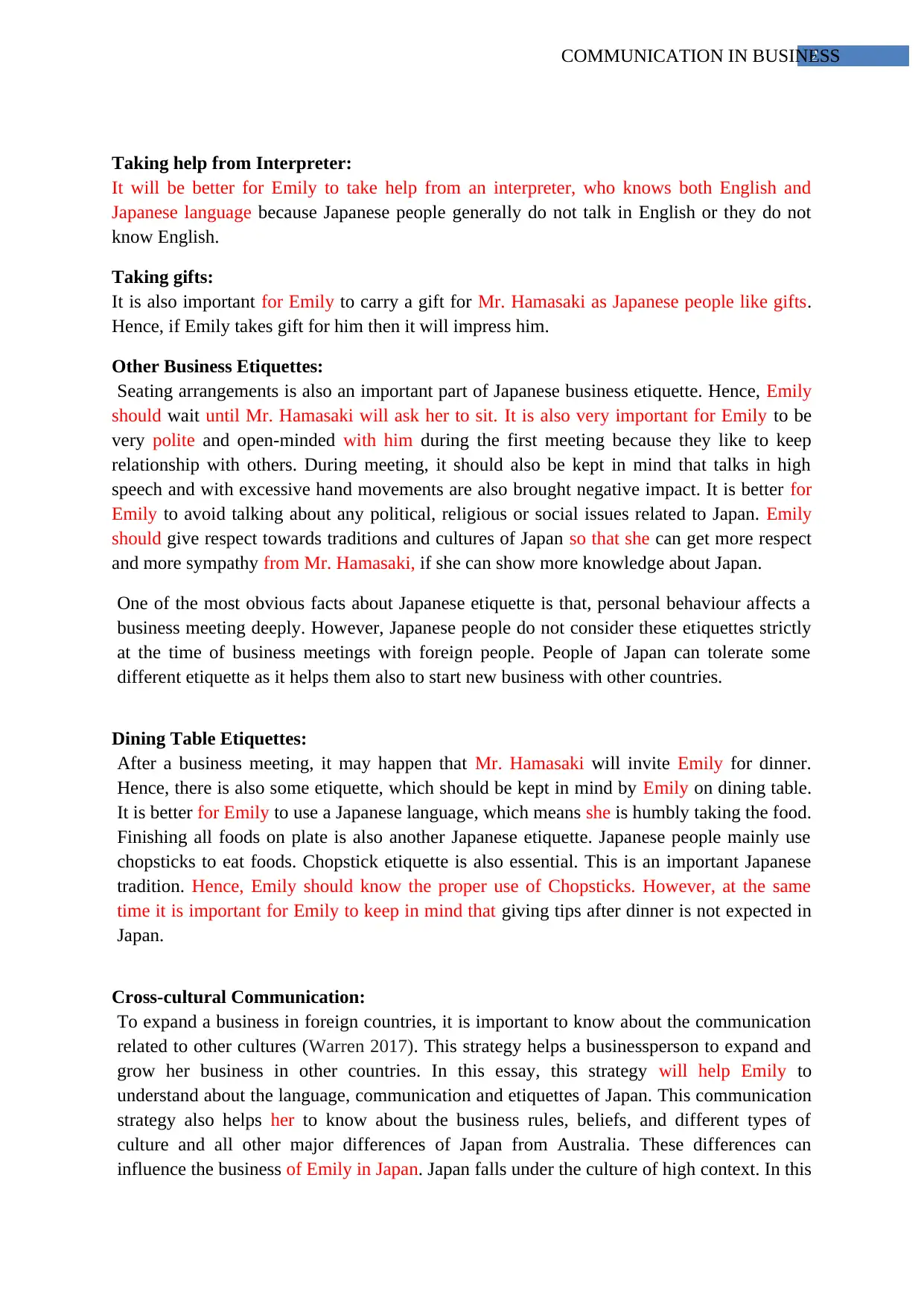
2COMMUNICATION IN BUSINESS
Taking help from Interpreter:
It will be better for Emily to take help from an interpreter, who knows both English and
Japanese language because Japanese people generally do not talk in English or they do not
know English.
Taking gifts:
It is also important for Emily to carry a gift for Mr. Hamasaki as Japanese people like gifts.
Hence, if Emily takes gift for him then it will impress him.
Other Business Etiquettes:
Seating arrangements is also an important part of Japanese business etiquette. Hence, Emily
should wait until Mr. Hamasaki will ask her to sit. It is also very important for Emily to be
very polite and open-minded with him during the first meeting because they like to keep
relationship with others. During meeting, it should also be kept in mind that talks in high
speech and with excessive hand movements are also brought negative impact. It is better for
Emily to avoid talking about any political, religious or social issues related to Japan. Emily
should give respect towards traditions and cultures of Japan so that she can get more respect
and more sympathy from Mr. Hamasaki, if she can show more knowledge about Japan.
One of the most obvious facts about Japanese etiquette is that, personal behaviour affects a
business meeting deeply. However, Japanese people do not consider these etiquettes strictly
at the time of business meetings with foreign people. People of Japan can tolerate some
different etiquette as it helps them also to start new business with other countries.
Dining Table Etiquettes:
After a business meeting, it may happen that Mr. Hamasaki will invite Emily for dinner.
Hence, there is also some etiquette, which should be kept in mind by Emily on dining table.
It is better for Emily to use a Japanese language, which means she is humbly taking the food.
Finishing all foods on plate is also another Japanese etiquette. Japanese people mainly use
chopsticks to eat foods. Chopstick etiquette is also essential. This is an important Japanese
tradition. Hence, Emily should know the proper use of Chopsticks. However, at the same
time it is important for Emily to keep in mind that giving tips after dinner is not expected in
Japan.
Cross-cultural Communication:
To expand a business in foreign countries, it is important to know about the communication
related to other cultures (Warren 2017). This strategy helps a businessperson to expand and
grow her business in other countries. In this essay, this strategy will help Emily to
understand about the language, communication and etiquettes of Japan. This communication
strategy also helps her to know about the business rules, beliefs, and different types of
culture and all other major differences of Japan from Australia. These differences can
influence the business of Emily in Japan. Japan falls under the culture of high context. In this
Taking help from Interpreter:
It will be better for Emily to take help from an interpreter, who knows both English and
Japanese language because Japanese people generally do not talk in English or they do not
know English.
Taking gifts:
It is also important for Emily to carry a gift for Mr. Hamasaki as Japanese people like gifts.
Hence, if Emily takes gift for him then it will impress him.
Other Business Etiquettes:
Seating arrangements is also an important part of Japanese business etiquette. Hence, Emily
should wait until Mr. Hamasaki will ask her to sit. It is also very important for Emily to be
very polite and open-minded with him during the first meeting because they like to keep
relationship with others. During meeting, it should also be kept in mind that talks in high
speech and with excessive hand movements are also brought negative impact. It is better for
Emily to avoid talking about any political, religious or social issues related to Japan. Emily
should give respect towards traditions and cultures of Japan so that she can get more respect
and more sympathy from Mr. Hamasaki, if she can show more knowledge about Japan.
One of the most obvious facts about Japanese etiquette is that, personal behaviour affects a
business meeting deeply. However, Japanese people do not consider these etiquettes strictly
at the time of business meetings with foreign people. People of Japan can tolerate some
different etiquette as it helps them also to start new business with other countries.
Dining Table Etiquettes:
After a business meeting, it may happen that Mr. Hamasaki will invite Emily for dinner.
Hence, there is also some etiquette, which should be kept in mind by Emily on dining table.
It is better for Emily to use a Japanese language, which means she is humbly taking the food.
Finishing all foods on plate is also another Japanese etiquette. Japanese people mainly use
chopsticks to eat foods. Chopstick etiquette is also essential. This is an important Japanese
tradition. Hence, Emily should know the proper use of Chopsticks. However, at the same
time it is important for Emily to keep in mind that giving tips after dinner is not expected in
Japan.
Cross-cultural Communication:
To expand a business in foreign countries, it is important to know about the communication
related to other cultures (Warren 2017). This strategy helps a businessperson to expand and
grow her business in other countries. In this essay, this strategy will help Emily to
understand about the language, communication and etiquettes of Japan. This communication
strategy also helps her to know about the business rules, beliefs, and different types of
culture and all other major differences of Japan from Australia. These differences can
influence the business of Emily in Japan. Japan falls under the culture of high context. In this
⊘ This is a preview!⊘
Do you want full access?
Subscribe today to unlock all pages.

Trusted by 1+ million students worldwide
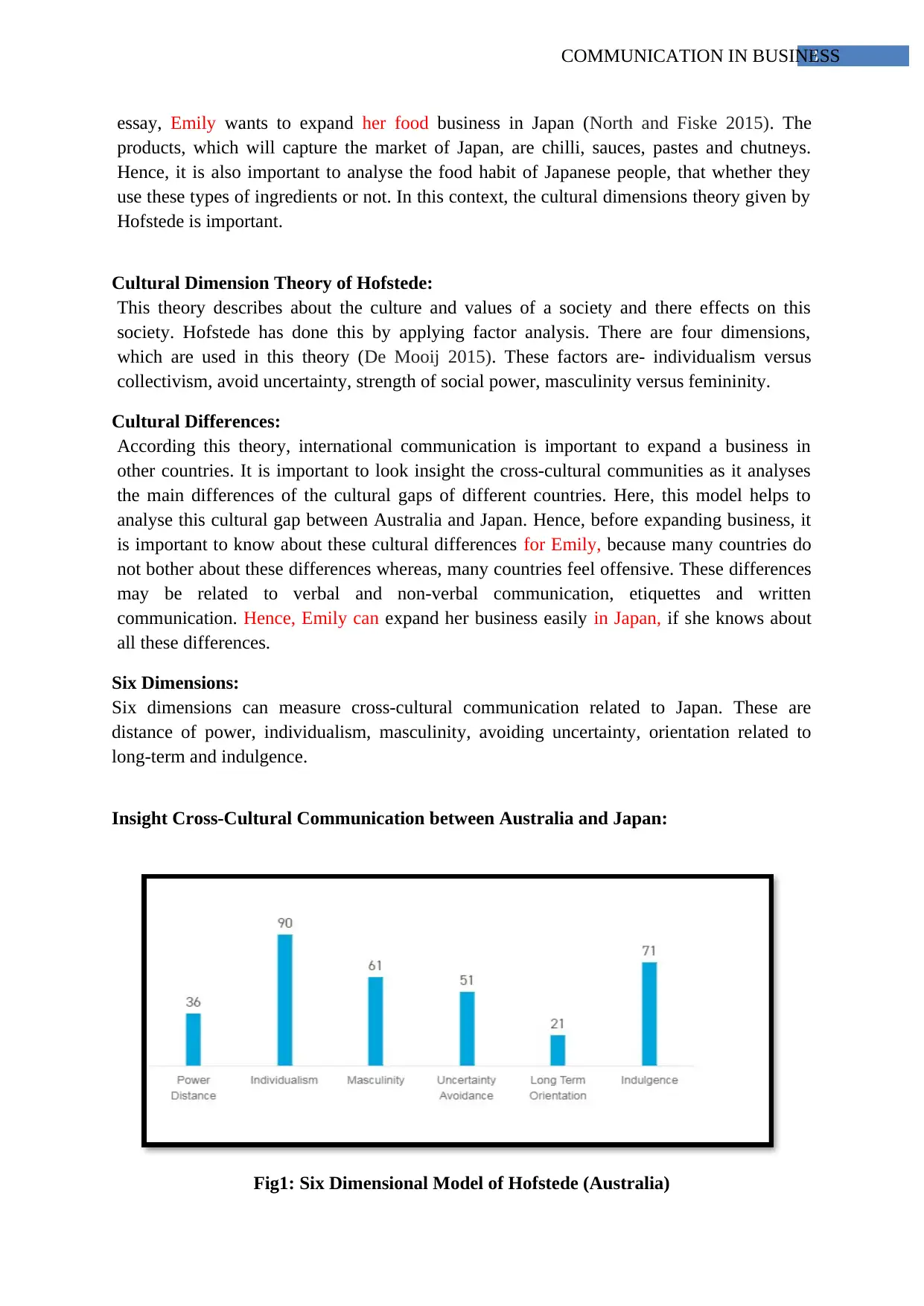
3COMMUNICATION IN BUSINESS
essay, Emily wants to expand her food business in Japan (North and Fiske 2015). The
products, which will capture the market of Japan, are chilli, sauces, pastes and chutneys.
Hence, it is also important to analyse the food habit of Japanese people, that whether they
use these types of ingredients or not. In this context, the cultural dimensions theory given by
Hofstede is important.
Cultural Dimension Theory of Hofstede:
This theory describes about the culture and values of a society and there effects on this
society. Hofstede has done this by applying factor analysis. There are four dimensions,
which are used in this theory (De Mooij 2015). These factors are- individualism versus
collectivism, avoid uncertainty, strength of social power, masculinity versus femininity.
Cultural Differences:
According this theory, international communication is important to expand a business in
other countries. It is important to look insight the cross-cultural communities as it analyses
the main differences of the cultural gaps of different countries. Here, this model helps to
analyse this cultural gap between Australia and Japan. Hence, before expanding business, it
is important to know about these cultural differences for Emily, because many countries do
not bother about these differences whereas, many countries feel offensive. These differences
may be related to verbal and non-verbal communication, etiquettes and written
communication. Hence, Emily can expand her business easily in Japan, if she knows about
all these differences.
Six Dimensions:
Six dimensions can measure cross-cultural communication related to Japan. These are
distance of power, individualism, masculinity, avoiding uncertainty, orientation related to
long-term and indulgence.
Insight Cross-Cultural Communication between Australia and Japan:
Fig1: Six Dimensional Model of Hofstede (Australia)
essay, Emily wants to expand her food business in Japan (North and Fiske 2015). The
products, which will capture the market of Japan, are chilli, sauces, pastes and chutneys.
Hence, it is also important to analyse the food habit of Japanese people, that whether they
use these types of ingredients or not. In this context, the cultural dimensions theory given by
Hofstede is important.
Cultural Dimension Theory of Hofstede:
This theory describes about the culture and values of a society and there effects on this
society. Hofstede has done this by applying factor analysis. There are four dimensions,
which are used in this theory (De Mooij 2015). These factors are- individualism versus
collectivism, avoid uncertainty, strength of social power, masculinity versus femininity.
Cultural Differences:
According this theory, international communication is important to expand a business in
other countries. It is important to look insight the cross-cultural communities as it analyses
the main differences of the cultural gaps of different countries. Here, this model helps to
analyse this cultural gap between Australia and Japan. Hence, before expanding business, it
is important to know about these cultural differences for Emily, because many countries do
not bother about these differences whereas, many countries feel offensive. These differences
may be related to verbal and non-verbal communication, etiquettes and written
communication. Hence, Emily can expand her business easily in Japan, if she knows about
all these differences.
Six Dimensions:
Six dimensions can measure cross-cultural communication related to Japan. These are
distance of power, individualism, masculinity, avoiding uncertainty, orientation related to
long-term and indulgence.
Insight Cross-Cultural Communication between Australia and Japan:
Fig1: Six Dimensional Model of Hofstede (Australia)
Paraphrase This Document
Need a fresh take? Get an instant paraphrase of this document with our AI Paraphraser

4COMMUNICATION IN BUSINESS
Source: (Yang et al. 2016)
Source: (Yang et al. 2016)
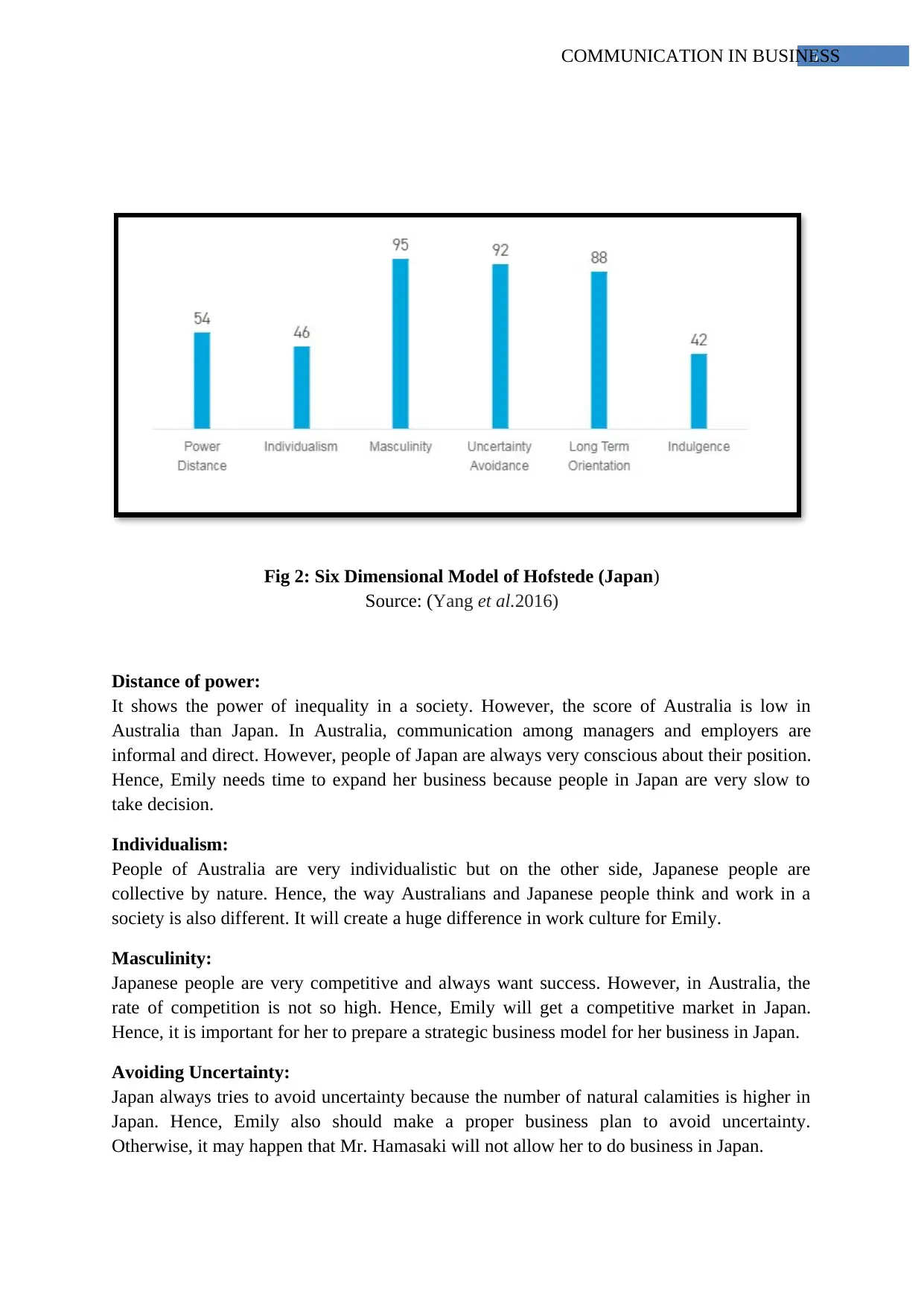
5COMMUNICATION IN BUSINESS
Fig 2: Six Dimensional Model of Hofstede (Japan)
Source: (Yang et al.2016)
Distance of power:
It shows the power of inequality in a society. However, the score of Australia is low in
Australia than Japan. In Australia, communication among managers and employers are
informal and direct. However, people of Japan are always very conscious about their position.
Hence, Emily needs time to expand her business because people in Japan are very slow to
take decision.
Individualism:
People of Australia are very individualistic but on the other side, Japanese people are
collective by nature. Hence, the way Australians and Japanese people think and work in a
society is also different. It will create a huge difference in work culture for Emily.
Masculinity:
Japanese people are very competitive and always want success. However, in Australia, the
rate of competition is not so high. Hence, Emily will get a competitive market in Japan.
Hence, it is important for her to prepare a strategic business model for her business in Japan.
Avoiding Uncertainty:
Japan always tries to avoid uncertainty because the number of natural calamities is higher in
Japan. Hence, Emily also should make a proper business plan to avoid uncertainty.
Otherwise, it may happen that Mr. Hamasaki will not allow her to do business in Japan.
Fig 2: Six Dimensional Model of Hofstede (Japan)
Source: (Yang et al.2016)
Distance of power:
It shows the power of inequality in a society. However, the score of Australia is low in
Australia than Japan. In Australia, communication among managers and employers are
informal and direct. However, people of Japan are always very conscious about their position.
Hence, Emily needs time to expand her business because people in Japan are very slow to
take decision.
Individualism:
People of Australia are very individualistic but on the other side, Japanese people are
collective by nature. Hence, the way Australians and Japanese people think and work in a
society is also different. It will create a huge difference in work culture for Emily.
Masculinity:
Japanese people are very competitive and always want success. However, in Australia, the
rate of competition is not so high. Hence, Emily will get a competitive market in Japan.
Hence, it is important for her to prepare a strategic business model for her business in Japan.
Avoiding Uncertainty:
Japan always tries to avoid uncertainty because the number of natural calamities is higher in
Japan. Hence, Emily also should make a proper business plan to avoid uncertainty.
Otherwise, it may happen that Mr. Hamasaki will not allow her to do business in Japan.
⊘ This is a preview!⊘
Do you want full access?
Subscribe today to unlock all pages.

Trusted by 1+ million students worldwide
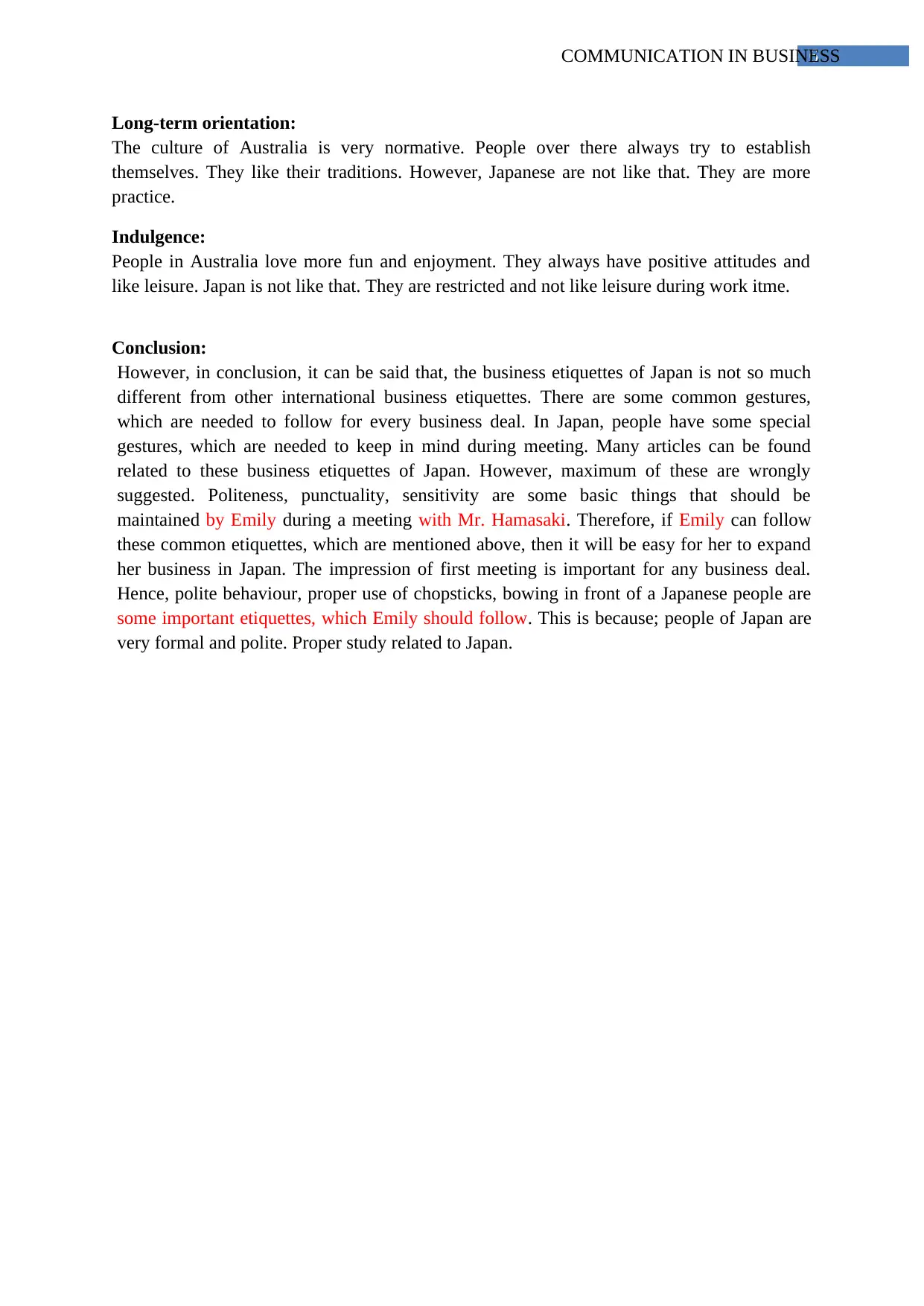
6COMMUNICATION IN BUSINESS
Long-term orientation:
The culture of Australia is very normative. People over there always try to establish
themselves. They like their traditions. However, Japanese are not like that. They are more
practice.
Indulgence:
People in Australia love more fun and enjoyment. They always have positive attitudes and
like leisure. Japan is not like that. They are restricted and not like leisure during work itme.
Conclusion:
However, in conclusion, it can be said that, the business etiquettes of Japan is not so much
different from other international business etiquettes. There are some common gestures,
which are needed to follow for every business deal. In Japan, people have some special
gestures, which are needed to keep in mind during meeting. Many articles can be found
related to these business etiquettes of Japan. However, maximum of these are wrongly
suggested. Politeness, punctuality, sensitivity are some basic things that should be
maintained by Emily during a meeting with Mr. Hamasaki. Therefore, if Emily can follow
these common etiquettes, which are mentioned above, then it will be easy for her to expand
her business in Japan. The impression of first meeting is important for any business deal.
Hence, polite behaviour, proper use of chopsticks, bowing in front of a Japanese people are
some important etiquettes, which Emily should follow. This is because; people of Japan are
very formal and polite. Proper study related to Japan.
Long-term orientation:
The culture of Australia is very normative. People over there always try to establish
themselves. They like their traditions. However, Japanese are not like that. They are more
practice.
Indulgence:
People in Australia love more fun and enjoyment. They always have positive attitudes and
like leisure. Japan is not like that. They are restricted and not like leisure during work itme.
Conclusion:
However, in conclusion, it can be said that, the business etiquettes of Japan is not so much
different from other international business etiquettes. There are some common gestures,
which are needed to follow for every business deal. In Japan, people have some special
gestures, which are needed to keep in mind during meeting. Many articles can be found
related to these business etiquettes of Japan. However, maximum of these are wrongly
suggested. Politeness, punctuality, sensitivity are some basic things that should be
maintained by Emily during a meeting with Mr. Hamasaki. Therefore, if Emily can follow
these common etiquettes, which are mentioned above, then it will be easy for her to expand
her business in Japan. The impression of first meeting is important for any business deal.
Hence, polite behaviour, proper use of chopsticks, bowing in front of a Japanese people are
some important etiquettes, which Emily should follow. This is because; people of Japan are
very formal and polite. Proper study related to Japan.
Paraphrase This Document
Need a fresh take? Get an instant paraphrase of this document with our AI Paraphraser
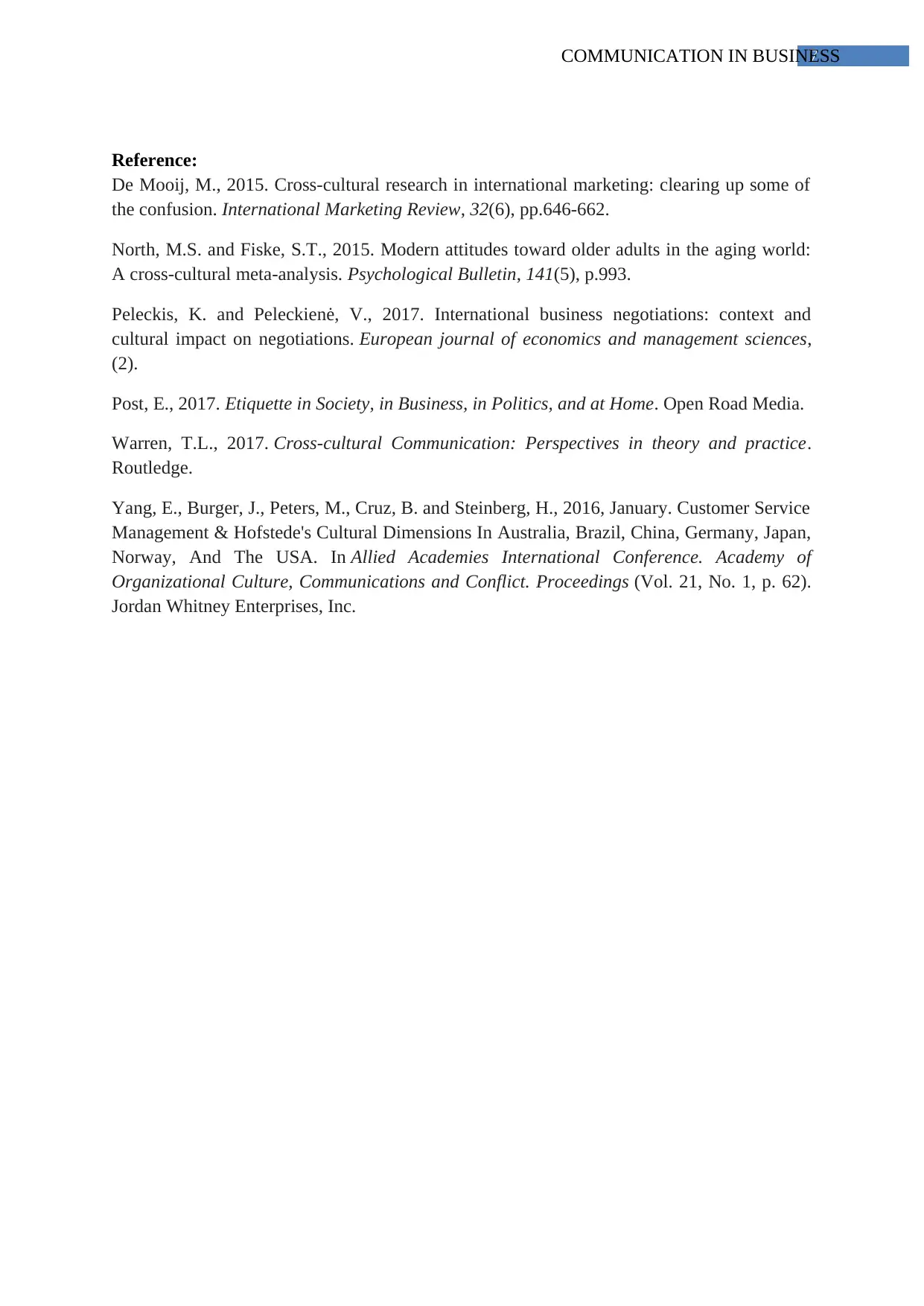
7COMMUNICATION IN BUSINESS
Reference:
De Mooij, M., 2015. Cross-cultural research in international marketing: clearing up some of
the confusion. International Marketing Review, 32(6), pp.646-662.
North, M.S. and Fiske, S.T., 2015. Modern attitudes toward older adults in the aging world:
A cross-cultural meta-analysis. Psychological Bulletin, 141(5), p.993.
Peleckis, K. and Peleckienė, V., 2017. International business negotiations: context and
cultural impact on negotiations. European journal of economics and management sciences,
(2).
Post, E., 2017. Etiquette in Society, in Business, in Politics, and at Home. Open Road Media.
Warren, T.L., 2017. Cross-cultural Communication: Perspectives in theory and practice.
Routledge.
Yang, E., Burger, J., Peters, M., Cruz, B. and Steinberg, H., 2016, January. Customer Service
Management & Hofstede's Cultural Dimensions In Australia, Brazil, China, Germany, Japan,
Norway, And The USA. In Allied Academies International Conference. Academy of
Organizational Culture, Communications and Conflict. Proceedings (Vol. 21, No. 1, p. 62).
Jordan Whitney Enterprises, Inc.
Reference:
De Mooij, M., 2015. Cross-cultural research in international marketing: clearing up some of
the confusion. International Marketing Review, 32(6), pp.646-662.
North, M.S. and Fiske, S.T., 2015. Modern attitudes toward older adults in the aging world:
A cross-cultural meta-analysis. Psychological Bulletin, 141(5), p.993.
Peleckis, K. and Peleckienė, V., 2017. International business negotiations: context and
cultural impact on negotiations. European journal of economics and management sciences,
(2).
Post, E., 2017. Etiquette in Society, in Business, in Politics, and at Home. Open Road Media.
Warren, T.L., 2017. Cross-cultural Communication: Perspectives in theory and practice.
Routledge.
Yang, E., Burger, J., Peters, M., Cruz, B. and Steinberg, H., 2016, January. Customer Service
Management & Hofstede's Cultural Dimensions In Australia, Brazil, China, Germany, Japan,
Norway, And The USA. In Allied Academies International Conference. Academy of
Organizational Culture, Communications and Conflict. Proceedings (Vol. 21, No. 1, p. 62).
Jordan Whitney Enterprises, Inc.
1 out of 8
Related Documents
Your All-in-One AI-Powered Toolkit for Academic Success.
+13062052269
info@desklib.com
Available 24*7 on WhatsApp / Email
![[object Object]](/_next/static/media/star-bottom.7253800d.svg)
Unlock your academic potential
Copyright © 2020–2026 A2Z Services. All Rights Reserved. Developed and managed by ZUCOL.





